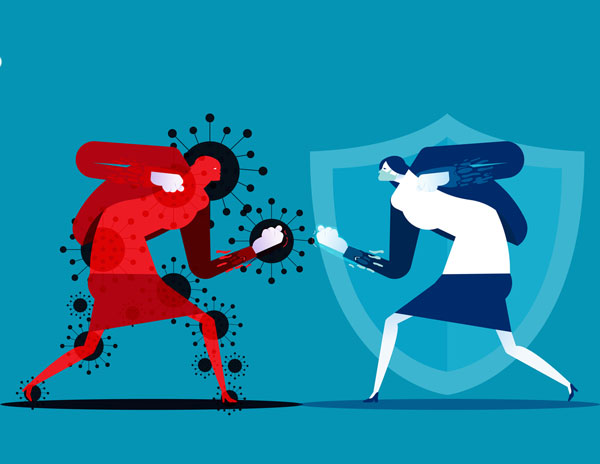Can you be responsible for someone contracting the coronavirus from you? If you get COVID-19, can you sue someone who infected you? Is intentionally infecting someone with COVID-19 a crime?

Perhaps. This article will explore the civil and criminal law issues raised by the coronavirus pandemic and is from the office of noted personal injury and RSD lawyers Schwarz & Schwarz.
Negligence and COVID-19
Someone infected by COVID-19 may have grounds for a personal injury lawsuit due to someone’s negligence.
In order to prove that someone infected you with COVID-19 negligently, or that their negligence caused you to contract COVID-19, you need to prove the following:
The Defendant Had a Duty to You
This is a sticky point because many people refuse to wear masks to protect others from the aerosols in their own breath, which may contain the coronavirus.
Whether just anyone on the street has a duty to protect others from their breath, whether they know they have COVID-19 or not, has yet to be proven. Will it make a difference if the negligent COVID-19 spreader is a family member, an employer, a coworker, a friend, a mail carrier, a grocery store clerk, a doctor, or a stranger? It may.
Another argument is that the defendant has a duty to keep the plaintiff’s environment free from contagion. Does an employer have a duty to employees to keep the workplace safe? Do family members have a duty to each other to avoid each other if they contract the coronavirus? Does a store manager have a duty to you to keep infected employees home? These are all questions to be raised in court.
The Defendant Breached That Duty
One can argue that refusing to wear a mask, or wearing a mask improperly such as not covering one’s nose, is a breach of duty to protect others from your breath. Again, the anti-maskers will tout their reasons for not wearing a mask, such as personal liberties or the ineffectiveness of wearing a mask.
If the argument is that the defendant’s duty was to keep the plaintiff’s environment free from contagion, then the plaintiff must show that defendant’s actions or lack of action breached that duty.
The Breach of Duty Caused You to Contract COVID-19
The plaintiff must be able to show that the defendant was the only COVID-19-positive individual who could have infected them, or that the defendant negligently created the conditions that allowed the plaintiff to get infected.
Contracting COVID-19 Caused You Harm
Whether the plaintiff has a severe case of COVID-19 or is entirely asymptomatic matters not. When one tests positive for COVID-19 one must quarantine for 14 days, causing a loss of personal liberty, possibly loss of work, and possible loss of family relations. Also, this disease is too new to know for certain whether those who contract COVID-19 will suffer long-term effects or, if asymptomatic, suffer harm that makes them more susceptible to neurological, respiratory, or coronary conditions in later years.
As lawsuits are filed and judgments are entered, the law will evolve and show whether plaintiffs can succeed at proving negligence when the defendant had COVID-19 and negligently infected them, or when the defendant’s negligence caused the plaintiff to be infected.
Assault and COVID-19
Intentionally infecting someone with COVID-19 may be prosecuted as criminal assault and battery, and the person who was intentionally infected can sue for civil liability as well.
Assault and Battery are two different crimes. Assault is typically defined as engaging in conduct that places another in reasonable apprehension of suffering bodily harm. Battery is causing bodily harm, or making physical contact of an insulting or provoking nature. The person threatening contact or making the contact must do so knowingly to be found guilty of either assault or battery or both.
Coughing on someone when both you and they know that you have COVID-19 can be prosecuted as both assault and battery. If the person coughed on does not know you have COVID-19 but later gets COVID-19 and finds out they got it from you, you can be prosecuted for battery.
Intentional Infliction of Emotional Distress and COVID-19
If someone is convicted of assault, battery, or both, due to intentionally trying to infect another with COVID-19, the victim has grounds to file a civil case for intentional infliction of emotional distress in addition to their personal injury claims. This can enhance the money judgment significantly, and the judge may be persuaded to impose punitive (punishing) damages on the defendant as well to deter others from engaging in the same tortious and perhaps criminal conduct.
Veronica Davis is a writer, blogger, and legal assistant operating out of the greater Philadelphia area. She writes for Todd Mosser, a successful criminal appellate attorney.

